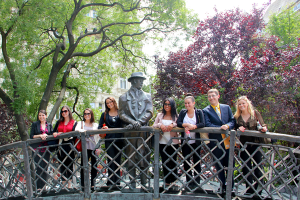[media-credit name=”Christopher Ball” align=”alignright” width=”300″] [/media-credit]This summer, 13 students in the master of business administration (MBA) program traveled to Hungary to meet with business and government leaders in hopes of learning the differences between corporations in and outside of the United States.
[/media-credit]This summer, 13 students in the master of business administration (MBA) program traveled to Hungary to meet with business and government leaders in hopes of learning the differences between corporations in and outside of the United States.
The students had the opportunity to tour Parliament, meet with a senior adviser to Prime Minister Viktor Orban and meet executives from more than a dozen corporations like Exxon Mobil, General Electric and Morgan Stanley.
“The object is to expose the students to international business practices,” said Christopher Ball, associate professor of economics and director of the Central European Institute, which co-sponsored the trip with the School of Business.
This was the sixth year students and faculty traveled to Hungary and Ball says that the demand for Quinnipiac students is constantly increasing.
“They become real partners for Quinnipiac,” he said. “Many of these companies have reached out about doing internships for our students.”
During the two-week trip, students visited about two companies each day to become familiar with their ways of business, ask questions and make new insights.
“We visit companies to gain a basic understanding and overview of Hungary,” Ball said.
“The students get to learn about different business practices.”
In addition to learning about new business techniques, the students also have free time to explore the area. The students and businesses also take part in a networking reception where around 150 people represent up to 80 businesses, according to Ball.
MBA student Brett Bradanini went on the trip this summer.
“The trip overall was a great cultural experience,” Bradanini said. “They’re not as technologically evolved as us, but they still have the basics. I think it’s great in regards to getting us out of the sheltered Quinnipiac situation. We’re in a little bubble and there’s more than just Quinnipiac out there.”
Bradanini was intrigued by the differences in architecture, but was surprised by the strong similarities in etiquette.
“It’s a perfect balance between business and pleasure,” Bradanini said. “You visit a lot of awesome companies, but you get enough downtime where you can actually go exploring.”
According to Ball, part of the reason the trip is so successful is because students feel comfortable walking around due to the size of the cities and general feel. Ball said that he tries to make the trip seem like more of a business trip rather than a class.
“You gain exposure to foreign cultures and foreign ways of thinking,” he said. “You get exposure to people doing business in different countries and how they think about it differently.”
The Hungary trip has always been exclusive because of a long working relationship, scholarship programs and the Central European Institute, Ball said. The trip to Hungary was the first trip provided to MBA students who can now also choose trips to England and China, among several countries.
“Professor Ball did an outstanding job balancing the amount of school work we had, the amount of companies we saw, and our downtime overall,” Bardanini said. “It was an awesome two-week trip and the way he set things up were perfect.”
Meeting executives in Budapest, a weekend in southern Hungary and the networking event are the students’ favorite activities during the trip, Ball said. Some Quinnipiac alumni also attended portions of the trip due to its popularity.
“The goal is to have a cultural experience and this trip does that perfectly,” Bradanini said.













